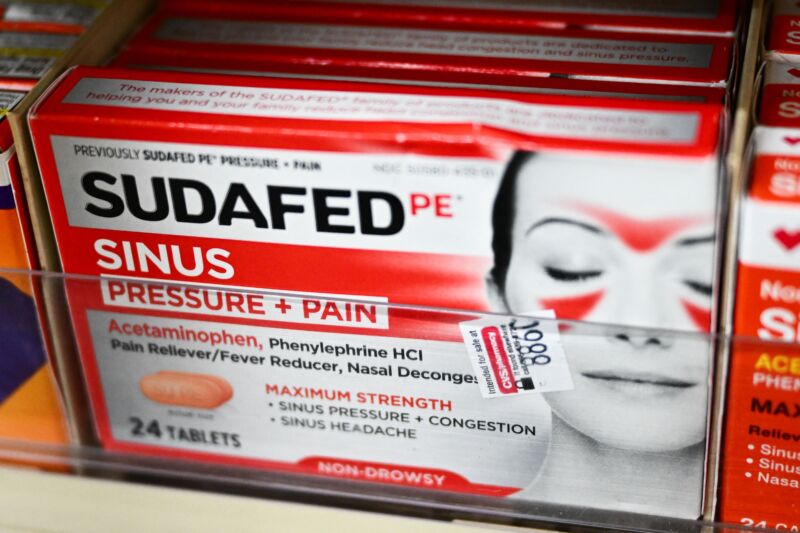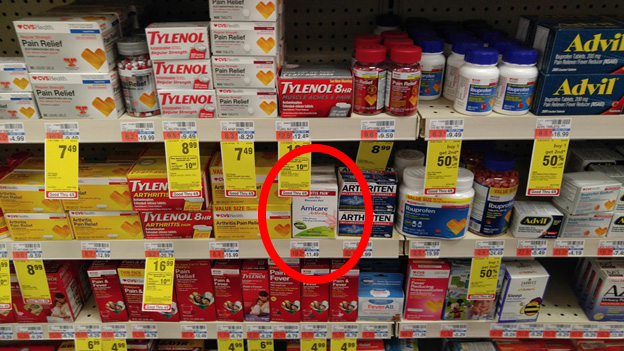
Drug store giant CVS revealed late last week that it is voluntarily pulling some common cold and flu medicines from its shelves because they don’t work—while many other ineffective products remain on the shelves.
The move by CVS comes after an advisory panel for the Food and Drug Administration last month voted unanimously that the common decongestant, phenylephrine, is ineffective at treating a stuffy nose. But it comes ahead of the FDA itself acting on the vote, which will likely lead the agency to revoke phenylephrine’s approval, eventually.
In a statement to Ars, a CVS spokesperson suggested the FDA advisory panel’s vote was the impetus for the change, but that it would “follow direction from the FDA.”
“We are removing a small number of oral decongestant products that contain phenylephrine as the only active ingredient from CVS Pharmacy stores but will continue offering many other oral cough and cold products to meet consumer needs,” CVS’s statement read. It didn’t provide additional details on which or how many products would be removed, or when the removals would be complete.
The culling of phenylephrine products from drug-store shelves is a long-sought win for both researchers and consumers. Since at least 2007, researchers have expressed doubt about the effectiveness of phenylephrine, which is in popular oral medicines with brand names including Sudafed, Mucinex, Nyquil, and Benadryl. The small studies from the 1960s and 1970s that formed the basis of the FDA’s initial approval in 1976 were found to be seriously flawed. And three large clinical trials since 2007 showed the drug doesn’t work. Pharmacological studies showed why: Phenylephrine is highly metabolized in the gut, with less than 1 percent of active drug remaining bioavailable. Consumers, meanwhile, were largely in the dark, spending nearly $2 billion in 2022 on these products that researchers have said for years don’t work.
But as these useless drugs finally vanish from CVS shelves, left behind is an entire class of products that are equally useless: homeopathic products.
“Snake oil” remains
These bogus treatments are based on centuries-old pseudoscience and have repeatedly been proven to be no more effective than placebo. In fact, if they were to prove effective, it would upend fundamental scientific understandings. For decades, consumer advocates and watchdogs have railed against them, yet these products are readily available on the shelves of every major drug store.
Homeopathy relies on two false ideas: the “law of similars” aka “like cures like,” meaning a substance that causes a specific symptom in a healthy person can treat conditions and diseases in an ill person with that same symptom; and the “law of infinitesimals,” which states that diluting a supposedly curative substance renders it more potent at treating medical conditions. As such, homeopathic products often start with bizarre, sometimes toxic substances that end up being diluted into oblivion in ritualistic procedures. The result is simply water or inactive filler ingredients. Homeopaths have acknowledged this and sometimes counter that water molecules have a “memory” of substances (they don’t).

A homeopathic product lurking on a CVS shelf alongside real medicines.
CFI
Sound absurd? It is. And yet, homeopathic products are not only available in major drug stores and retailers around the country, they’re often sold on the same shelves, side by side with evidence-based medicines that have gone through rigorous FDA safety and efficacy evaluations.
The FDA does have the authority to regulate homeopathic products. But, based on the 1938 Food, Drug, and Cosmetic Act, homeopathic products are generally considered exempt from pre-market FDA safety and efficacy reviews as long as the active ingredient is included in the Homeopathic Pharmacopoeia, a published list of substances approved by homeopaths. As such, homeopathic products enter the market without any FDA review—and sit on shelves with FDA-approved, evidence-based medicines.
“Most people don’t know what this stuff is,” Nicholas Little, vice president and legal director for the consumer advocacy organization the Center for Inquiry (CFI), said of homeopathic products in an interview with Ars.









